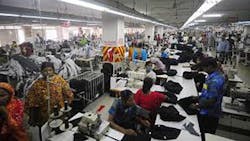DHAKA, Bangladesh—Output from Bangladesh's accident-prone garment sector increased in June, with demand from foreign retailers still growing despite the country's factory disaster in April, according to data released today.
At least 1,129 people were killed when the Rana Plaza factory complex collapsed outside the capital Dhaka in April, sparking demonstrations against Western brands and prompting some retailers to threaten to cancel orders.
Government data released today showed that the country's total exports—80% of which come from the garment sector—soared by 16% year-on-year in June to $2.7 billion, following an increase of 15% in May.
"The disasters didn't have much impact; they are scattered incidents," said Shuvhashish Bose, head of the government's Export Promotion Bureau, in reference to the Rana Plaza tragedy and other factory fires that have killed another 130 workers since November.
Total exports from Bangladesh, the second-biggest clothing manufacturer in the world after China, grew by 11% to a record $27.0 billion in the 12-month period ended June 30.
"The robust export growth was mainly powered by booming garment exports in the second half of the year," Bose said, adding that shipments in June were the highest for the year.
"Exports are growing because most Western retailers still find our prices competitive," Bose said.
Annual apparel sales stood at $21.5 billion, the EPB data showed, with more than three-quarters destined for Western consumers in Europe and the United States.
On Monday, 70 top retailers including H&M, Inditex and Primark announced plans to inspect all of their factories in Bangladesh in the next nine months in an effort to improve worker safety.
The same day the Bangladesh government agreed to a European Union-proposed "sustainability compact" to improve labor rights and factory safety, committing to uphold union rights and to add 200 more inspectors by the end of the year.
The EU is the largest trade partner of Bangladesh, accounting for 60% of Dhaka's annual garment exports.
Copyright Agence France-Presse, 2013
About the Author
Agence France-Presse
Copyright Agence France-Presse, 2002-2025. AFP text, photos, graphics and logos shall not be reproduced, published, broadcast, rewritten for broadcast or publication or redistributed directly or indirectly in any medium. AFP shall not be held liable for any delays, inaccuracies, errors or omissions in any AFP content, or for any actions taken in consequence.
